Related Research Articles
Country rock is a genre of music which fuses rock and country. It was developed by rock musicians who began to record country-flavored records in the late 1960s and early 1970s. These musicians recorded rock records using country themes, vocal styles, and additional instrumentation, most characteristically pedal steel guitars. Country rock began with artists like Buffalo Springfield, Michael Nesmith, Bob Dylan, Nitty Gritty Dirt Band, the Byrds, the Flying Burrito Brothers, The International Submarine Band and others, reaching its greatest popularity in the 1970s with artists such as Emmylou Harris, the Eagles, the New Riders of the Purple Sage, Linda Ronstadt, Poco, Charlie Daniels Band, and Pure Prairie League. Country rock also influenced artists in other genres, including The Band, the Grateful Dead, Creedence Clearwater Revival, The Rolling Stones, and George Harrison's solo work, as well as playing a part in the development of Southern rock.

The Byrds were an American rock band formed in Los Angeles, California, in 1964. The band underwent multiple lineup changes throughout its existence, with frontman Roger McGuinn remaining the sole consistent member. Although their time as one of the most popular groups in the world only lasted for a short period in the mid-1960s, the Byrds are today considered by critics to be among the most influential rock acts of their era. Their signature blend of clear harmony singing and McGuinn's jangly 12-string Rickenbacker guitar was "absorbed into the vocabulary of rock" and has continued to be influential.
Al Perkins is an American guitarist known primarily for his steel guitar work. The Gibson guitar company called Perkins "the world's most influential dobro player" and began producing an "Al Perkins Signature" Dobro in 2001—designed and autographed by Perkins.
"Mr. Tambourine Man" is a song written by Bob Dylan, released as the first track of the acoustic side of his March 1965 album Bringing It All Back Home. The song's popularity led to Dylan recording it live many times, and it has been included in multiple compilation albums. It has been translated into other languages and has been used or referenced in television shows, films, and books.
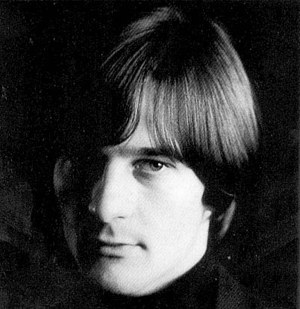
Harold Eugene Clark was an American singer-songwriter and founding member of the folk rock band the Byrds. He was the Byrds' principal songwriter between 1964 and early 1966, writing most of the band's best-known originals from this period, including "I'll Feel a Whole Lot Better", "She Don't Care About Time", "Eight Miles High" and "Set You Free This Time". Although he did not achieve commercial success as a solo artist, Clark was in the vanguard of popular music during much of his career, prefiguring developments in such disparate subgenres as psychedelic rock, baroque pop, newgrass, country rock, and alternative country. He was inducted into the Rock and Roll Hall of Fame in 1991 as a member of the Byrds.
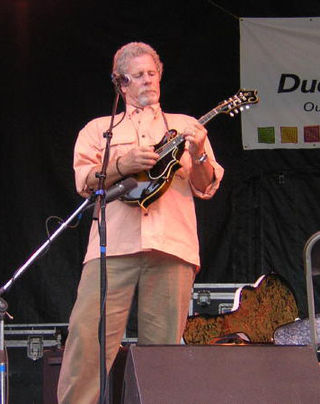
Christopher Hillman is an American musician. He was the original bassist of and one of the original members of the Byrds, which in 1965 included Roger McGuinn, Gene Clark, David Crosby and Michael Clarke.
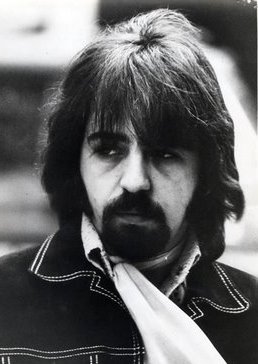
Clarence White was an American bluegrass and country guitarist and singer. He is best known as a member of the bluegrass ensemble the Kentucky Colonels and the rock band the Byrds, as well as for being a pioneer of the musical genre of country rock during the late 1960s. White also worked extensively as a session musician, appearing on recordings by the Everly Brothers, Joe Cocker, Ricky Nelson, Pat Boone, the Monkees, Randy Newman, Gene Clark, Linda Ronstadt, Arlo Guthrie, and Jackson Browne among others.

Bernard Matthew Leadon III is an American singer, musician, songwriter and founding member of the Eagles, for which he was inducted into the Rock and Roll Hall of Fame in 1998. Prior to the Eagles, he was a member of three country rock bands: Hearts & Flowers, Dillard & Clark, and the Flying Burrito Brothers. He is a multi-instrumentalist coming from a bluegrass background. He introduced elements of this music to a mainstream audience during his tenure with the Eagles.
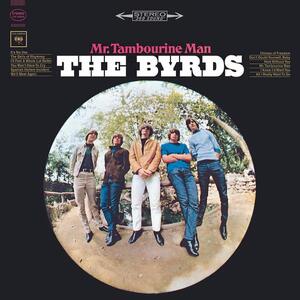
Mr. Tambourine Man is the debut studio album by the American rock band the Byrds and was released on June 21, 1965, by Columbia Records. The album is characterized by the Byrds' signature sound of Jim McGuinn's 12-string Rickenbacker guitar and the band's complex harmony singing. The material on the album mostly consists of cover versions of folk songs, primarily composed by Bob Dylan, and originals written or co-written by singer Gene Clark. Along with the Dylan-penned single of the same name, Mr. Tambourine Man established the band as an internationally successful act and is widely regarded by critics as representing the first effective American challenge to the chart dominance of the Beatles and other British Invasion bands during the mid-1960s.

Turn! Turn! Turn! is the second studio album by American rock band the Byrds, released on December 6, 1965, by Columbia Records. Like its predecessor, Mr. Tambourine Man, the album epitomized the folk rock genre and continued the band's successful mix of vocal harmony and jangly twelve-string Rickenbacker guitar. The album's lead single and title track, "Turn! Turn! Turn!", which was adapted by Pete Seeger from text in the Book of Ecclesiastes, had previously been arranged in a chamber-folk style by the Byrd's lead guitarist Jim McGuinn for folk singer Judy Collins' third album, but the arrangement he used for the Byrds' recording of the song utilizes the same folk-rock style as the band's previous hit singles.
The Greenbriar Boys were an American northern bluegrass music group. who first got together in jam sessions in New York's Washington Square Park.
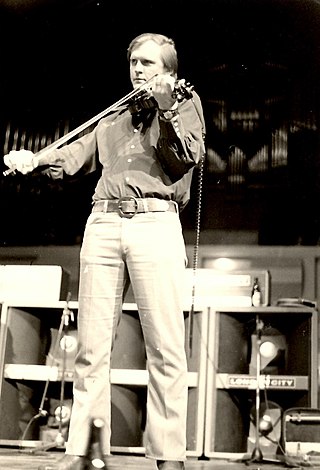
Byron Douglas Berline was an American fiddle player who played many American music styles, including old time, ragtime, bluegrass, Cajun, country, and rock.
"He Was a Friend of Mine" is a traditional folk song in which the singer laments the death of a friend. Ethnomusicologist Alan Lomax was the first to collect the song, in 1939, describing it as a "blues" that was "a dirge for a dead comrade."
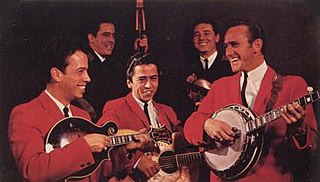
The Kentucky Colonels were a bluegrass band that was popular during the American folk music revival of the early 1960s. Formed in Burbank, California in 1954, the group released two albums, The New Sound of Bluegrass America (1963) and Appalachian Swing! (1964). The band featured the influential bluegrass guitarist Clarence White, who was largely responsible for making the acoustic guitar a lead instrument within bluegrass, and who later went on to join the Los Angeles rock band the Byrds. The Kentucky Colonels disbanded in late 1965, with two short-lived reunions taking place in 1966 and 1973.

Pickin' & Fiddlin' is the third album by American band the Dillards, recorded with up and coming fiddle player Byron Berline. The album is entirely instrumental, with no vocals. The group had been unhappy with Elektra because they felt pressure from the company not to innovate, as they were beginning to do, and because they felt that Elektra was not doing enough to promote their records. The Dillards chose to record a strictly traditional album with Berline, a friend of the group, because they owed Elektra one more album. Rodney later stated, "That wasn't a record made for anyone but the traditionals. We got completely hacked to pieces by them. So we said, 'Okay, screw you guys, we'll make an album, and we'll play it right up your ass!,' so we did."

Never Before is a compilation album by the American rock band the Byrds, consisting of previously unreleased outtakes, alternate versions, and rarities. It was initially released by Re-Flyte Records in December 1987 and was subsequently reissued on CD in 1989, with an additional seven bonus tracks.

The Hillmen is a studio album by the Hillmen, a southern California bluegrass band originally known as the Golden State Boys. The Hillmen consisted of Chris Hillman on mandolin, country singer/songwriter Vern Gosdin on guitar and lead vocals, his brother Rex Gosdin on double bass, and Don Parmley on banjo.

The Hillmen were a southern Californian bluegrass group. Formed in 1962, the original line-up of the Golden State Boys consisted of Vern Gosdin on guitar and lead vocals, his brother Rex Gosdin on double bass, Hal Poindexter on guitar, and Don Parmley on banjo. Poindexter left the group in late 1962, however, and was replaced by 17-year-old mandolin prodigy Chris Hillman. Hillman, who had previously been a member of the high-profile San Diego bluegrass group the Scottsville Squirrel Barkers, was invited to join the Golden State Boys by Parmley, after the pair met at a bluegrass evening at The Ice House folk club in Pasadena. Upon his recruitment, the group briefly changed their name to the Blue Diamond Boys before finally settling on The Hillmen, in honor of their mandolin playing wunderkind.

Douglas Flint Dillard was an American musician noted for his banjo proficiency and his pioneering participation in late-60s country rock.
References
- ↑ Hughes, Rob. "Jim Dickson Obituary | Music" The Guardian. Web. 8 Feb. 2012.
- ↑ "Jim Dickson". 103.5 QM/FM.
- 1 2 3 4 Rosenberg, Neil V. Bluegrass: A History. Urbana: University of Illinois, 1985. Print.
- ↑ Vinyl Cave: Northern bluegrass by The Greenbriar Boys – Isthmus | The Daily Page
- ↑ Jim Dickson RIP : Bluegrass Today
- ↑ Jim Dickson, Producer and Manager of the Byrds, Dead at 80 | Billboard
- ↑ Byrds manager Jim Dickson dies | Variety
- ↑ Four Strong Winds: Ian and Sylvia By John Einarson
- ↑ Desperados: The Roots of Country Rock By John Einarson